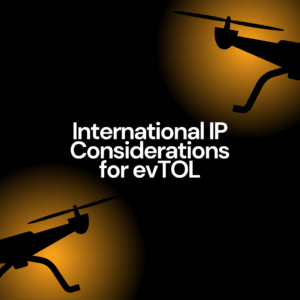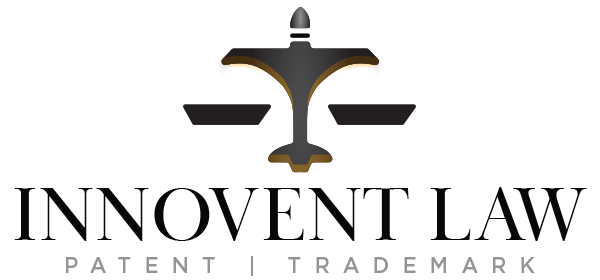International IP Considerations for eVTOL Companies: Protecting Innovation in a Competitive Market
The electric vertical takeoff and landing (eVTOL) industry is rapidly expanding, with companies worldwide developing cutting-edge aircraft for urban air mobility, defense, and cargo transport. As investment and innovation surge, intellectual property (IP) protection is becoming a critical issue for startups and established aerospace firms alike.
Successfully securing IP rights across international markets requires strategic patent filings, trademark registrations, and licensing agreements to avoid infringement risks and maintain a competitive edge. This guide explores the key international IP considerations for eVTOL companies and how businesses can protect their innovations globally.

Why International IP Protection Matters for eVTOL
The eVTOL market is expected to reach $23.21 billion by 2028, driven by advances in battery technology, autonomous flight, and urban mobility solutions. Companies developing eVTOL technologies must secure their patents, trademarks, and trade secrets to prevent unauthorized use and infringement lawsuits.
Given the international nature of aerospace development, protecting eVTOL IP in key markets like the U.S., Europe, China, and Japan is essential for:
- Securing Investment – Strong patent portfolios attract venture capital and licensing opportunities.
- Maintaining Competitive Advantage – Patents and trademarks ensure that proprietary designs and technology are legally protected.
- Preventing Infringement – Filing in multiple jurisdictions helps enforce IP rights against competitors.
Patent Protection Strategies for eVTOL Companies
Navigating the International Patent Landscape
Filing patents across multiple countries can be complex, as each jurisdiction has unique examination standards, eligibility criteria, and enforcement mechanisms. The most common strategies include:
- Patent Cooperation Treaty (PCT) – Allows companies to file a single international application, securing protection in over 150 countries.
- Direct National Filings – Some companies prefer to file patents directly in target markets like China, the European Union, and the U.S.
- Regional Patents – The European Patent Office (EPO) grants patents valid across multiple EU countries.
What eVTOL Technologies Can Be Patented?
The most valuable eVTOL patents typically focus on:
- Propulsion Systems – Hybrid-electric and battery-powered engines.
- Autonomous Navigation – AI-based flight controls and collision avoidance.
- Battery Management – Energy efficiency and fast-charging innovations.
- Airframe Design – Aerodynamic improvements for increased efficiency and range.
Companies must ensure their patent claims are well-defined and enforceable in international jurisdictions to avoid rejection or loopholes that competitors can exploit.
Trademark Considerations for eVTOL Startups
While patents protect technological innovations, trademarks safeguard brand identity by preventing competitors from using similar names or logos.
Where Should eVTOL Companies Register Trademarks?
To protect branding, logos, and model names, eVTOL companies should register trademarks in:
- United States (USPTO) – Essential for operating in the U.S. market.
- European Union Intellectual Property Office (EUIPO) – Covers all EU member states.
- China National Intellectual Property Administration (CNIPA) – China follows a first-to-file system, meaning brands risk losing their trademarks if they delay filing.
Common Trademark Issues in Aerospace
- Conflicts with Existing Trademarks – Conducting a comprehensive trademark search prevents legal disputes.
- International Classifications – eVTOL-related trademarks often fall under Class 12 (Vehicles & Transportation) or Class 42 (Engineering & Scientific Services).
- Brand Protection in Licensing Deals – Trademarks play a crucial role in partnerships and licensing agreements with manufacturers, suppliers, and government agencies.
Trade Secrets and Licensing Considerations for eVTOL Businesses
Protecting Proprietary Data Through Trade Secrets
Not all eVTOL innovations should be patented—some are better protected as trade secrets to prevent disclosure. Key strategies include:
- Non-Disclosure Agreements (NDAs) – Protect sensitive R&D information.
- Employee Confidentiality Agreements – Ensure proprietary knowledge remains in-house.
- Limited Access to Key Designs – Use digital security to prevent unauthorized access to blueprints and engineering schematics.
Licensing and Partnerships
Many eVTOL companies license technology to third parties, including automotive manufacturers, government agencies, and defense contractors. A well-structured licensing agreement should cover:
- Patent Ownership – Define which patents are included in the license.
- Royalty Structures – Outline fees and revenue-sharing models.
- Exclusivity Terms – Specify whether the license is exclusive or non-exclusive.
Regulatory Challenges and IP Enforcement in the eVTOL Industry
1. Compliance with Aviation Regulations
Before commercial launch, eVTOL aircraft must meet strict aviation safety standards set by:
- Federal Aviation Administration (FAA) (United States)
- European Union Aviation Safety Agency (EASA)
- Civil Aviation Administration of China (CAAC)
IP protection strategies should align with regulatory approval timelines to prevent delays in commercialization.
2. Enforcing eVTOL Patents Against Infringement
IP enforcement is particularly challenging in markets with weak patent protection, such as China and parts of Southeast Asia. eVTOL companies should:
- Monitor Competitor Filings – Track new patent applications to identify potential infringements.
- Partner with Local Law Firms – Enforce patents in foreign courts when necessary.
- Use Customs Enforcement – Block imports of infringing products through customs IP protection programs.
How Innovent Law Helps eVTOL Companies Protect IP
Navigating the global IP landscape requires expert legal guidance. Innovent Law specializes in:
- Patent Filing & Prosecution – Securing patents in key aerospace markets.
- International Trademark Protection – Registering and enforcing trademarks globally.
- Trade Secret Strategies – Helping companies safeguard proprietary R&D data.
- IP Licensing Agreements – Structuring strategic licensing deals for commercial partnerships.
Our team works closely with eVTOL innovators, tech startups, and aerospace companies to develop customized IP strategies that align with business goals and regulatory requirements.
Final Thoughts: Why IP Strategy is Critical for eVTOL Success
The eVTOL industry is rapidly evolving, and securing intellectual property is essential for long-term success. Companies must:
- File patents strategically to cover critical technologies.
- Register trademarks in key international markets.
- Leverage trade secrets to maintain a competitive edge.
- Develop licensing agreements to expand commercialization.
By taking proactive steps to protect IP, eVTOL companies can strengthen their market position, attract investors, and secure long-term profitability.
Next Steps
If you need assistance with patents, trademarks, or licensing for eVTOL technology, contact Innovent Law today to discuss your IP strategy.
